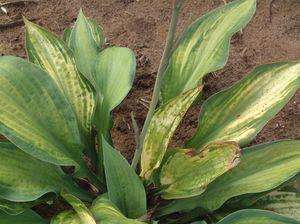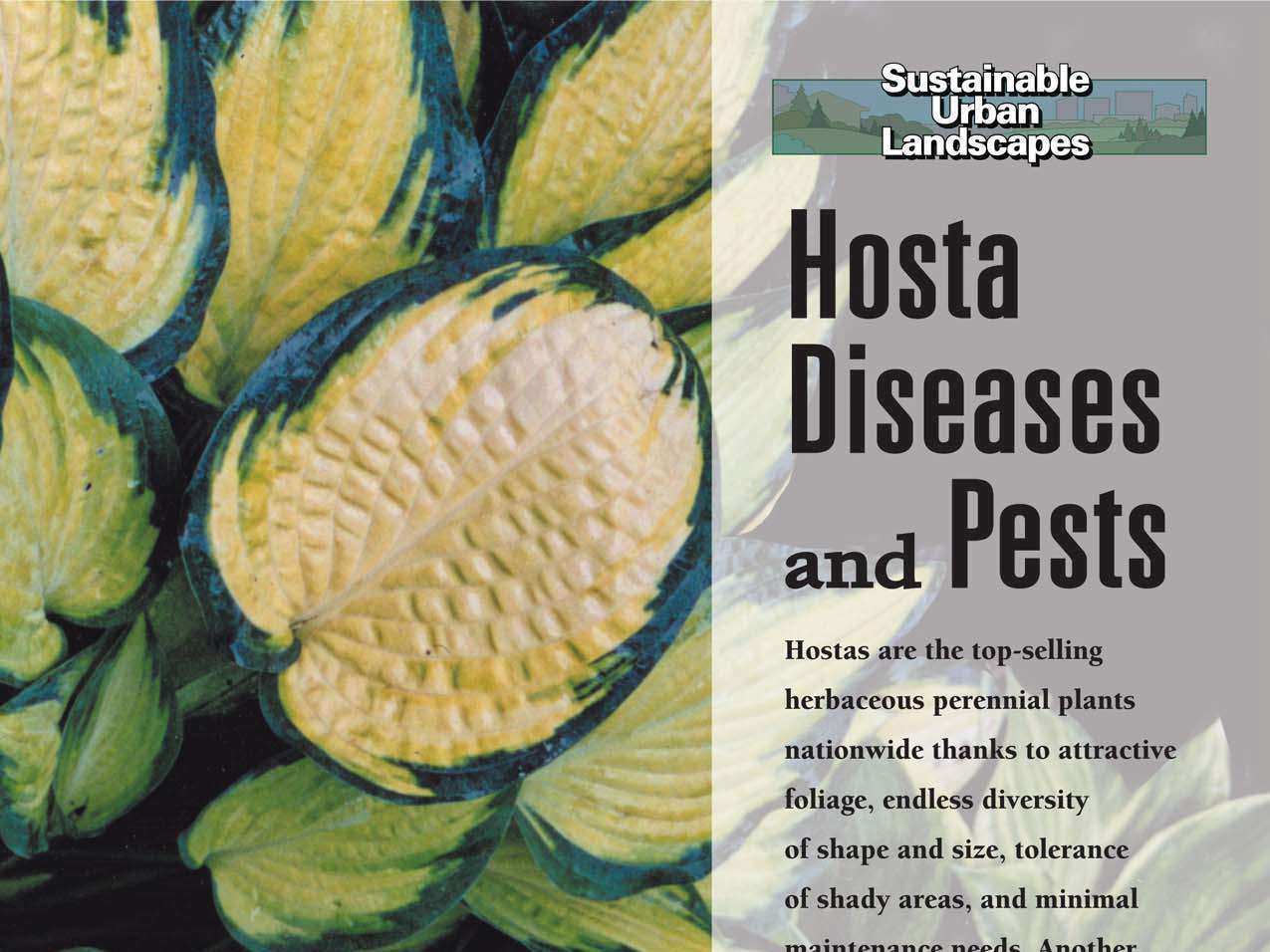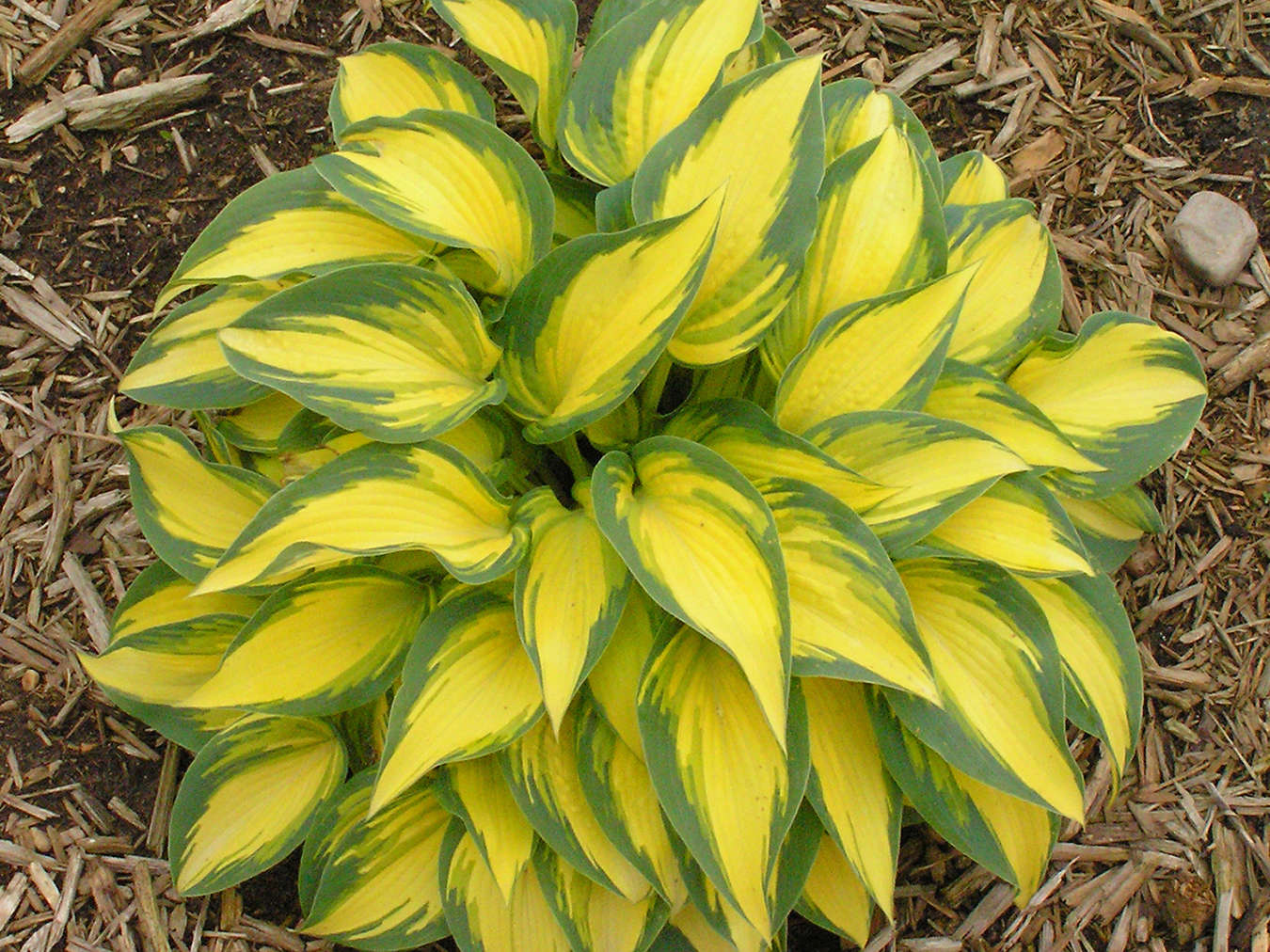Hosta Virus Myths
12/01/2008

FACT - Viruses do not just disappear, nor does a plant "fight off" an infection. The virus is permanent and will be with the plant until it dies. For practical purposes in the garden and nursery, there are no cures for viruses.
MYTH - Hostas from Tissue Culture will not have viruses.
FACT - If a hosta has a virus before going into tissue culture, the virus will be propagated along with the plant. Many infected hostas in the marketplace were tissue-cultured. Plants that were clean after the tissue culture process may also be infected when being grown on. Labs are beginning to test all propagating material so in the near future tissue cultured hostas from those labs will be clean.
MYTH - All hosta cultivars will exhibit the same symptoms if infected with the same virus.
FACT - Symptoms can vary considerably with the same virus, and different strains of a virus may cause different symptoms. In fact, HVX may exhibit yellow mottled blotches on some plants, green mottled blotches on further cultivars, and still different mottling on others.
MYTH - All mottled foliage in hostas is caused by viruses.
FACT - Mottling patterns in hostas can have a variety of causes, some of them environmental (i.e. late frosts), and many have causes which we do not yet understand. Old plants like 'Cynthia' and 'Filigree' have no known cause for their mottled appearance and have never been known to pass this trait to other plants.
MYTH - Viruses will kill, or at least severely inhibit growth of the host plant.
FACT - Eventually, some deterioration in the health of the plant can occur, but a plant may survive for many years when infected with a virus. Different viruses affect the plant's health at different rates, but some effects may go unnoticed. The possibility of a virus killing a plant immediately would greatly inhibit the spread of that virus, so in some sense, it is better in the survival of the virus to keep the host plant limping along.
MYTH - If symptoms disappear after showing up in a previous year the plant has either cured itself or didn't have a virus in the earlier year.
FACT - The expression of virus symptoms can disappear, but this does not mean the plant is cured. The virus is still present in the plant and still able to infect other plants. Sometimes this can be due to environmental factors that might reduce the rate a virus replicates thus preventing a high enough population, or titer, to effect expression. On their own, host plants are not capable of recovery from virus infections even with excellent conditions and culture.
MYTH - Removing a leaf showing infection, or dividing out the portion of the hosta showing symptoms will help cure the plant.
FACT - Removing some symptomatic tissue will have no real effect in "curing" a plant of a virus. Since most virus particle spread very efficiently throughout the same structures that move water and nutrients, the virus is already in all or most all parts of a plant by the time symptoms show.
MYTH - All plants infected with HVX will show symptoms immediately.
FACT - To the contrary, many plants in a study by Dr. Lockhart, virus specialist at the Univ. of Minnesota who originally characterized HVX, did not show symptoms after three years despite testing positive for infection. We do not know if they will ever show symptoms, but they are infectious in this state.
MYTH - If the symptoms have not spread to nearby plants the virus is safe.
FACT - If a virus is "safe", how did that plant catch it? The only way to tell if HVX has spread to other plants is through ELISA or other more sensitive scientific testing. It may be years before infected plants show symptoms.
MYTH - If a plant doesn't show symptoms it doesn't have a virus.
FACT - It can take years for an infected plant to show symptoms. During this time it very much can infect other plants. Only careful scientific testing can determine if a plant that does not show symptoms is infected with a virus - there is no way for the gardener or nursery owner to tell with any degree of certainty.
MYTH - HVX is the only virus affecting hostas.
FACT - There may be more than ten viruses currently known to be found in hostas. HVX is now the most common by far, but Impatiens Necrotic Spot, Tobacco Rattle Virus, and Tomato Ringspot Virus have been frequently identified. Some as yet unidentified viruses have appeared also.
MYTH - Symptoms of Hosta Virus X look attractive.
FACT - Actually, this is not really a myth. The effects of HVX on some hostas can be attractive to many, thus heightening the risk of introducing the virus into the home garden. In addition to the mottling, these symptoms can include making the infected plant more compact and more glaucous. Uninformed nursery professionals and home gardeners alike have actually named HVX-infected hostas and offered them as new varieties.
MYTH - If results of a virus test come back negative the plant is free of any virus.
FACT - Virus tests are quite specific for one particular virus, so it is possible for a negative test of one specific virus to miss a different virus. Also, some tests are not as sensitive as they may need to be in order to detect very early virus infections and therefore may give a false negative.
MYTH - If we pretend the virus doesn't exist it will go away.
FACT - If we ignore the presence of Hosta Virus X in our gardens or nurseries, it will continue to spread until many more plants have it. In time, the number of infected plants will increase beyond any hope of eliminating the virus. It is irresponsible to keep the virus around, because it can infect other plants and spread itself. All plants exhibiting HVX symptoms must be destroyed immediately to prevent further infection, and in nurseries all plants in a batch that had symptomatic individual plants must be also considered infected and likewise destroyed.
MYTH - Talking about HVX and other diseases will ruin hosta gardening.
FACT - While it may be unpopular in the short term, allowing incurable diseases to run unchecked through nurseries and gardens will certainly cause worse problems down the road. The long-term impact of disease-filled gardens on their owners will surely be a negative one and far outweigh any short-term effects of facing our problems now. A healthy garden is a source of joy to the gardener, but a garden full of diseases and other problems will never provide the same enjoyment, and if it gets worse every year we will lose our enthusiasm.
MYTH - People don't want to know about HVX.
FACT - It is not a pleasant subject, but as adults we all understand that life isn't perfect. The world contains many harmful organisms, and some of these do affect hostas. We can face the issues of plant health when we need to. We understand that sometimes there are outbreaks of a particular disease that require our special attention. We don't really want to know, but we have to know to keep our plants healthy. We don't want that information kept from us when the time comes that we need it.
MYTH - Viruses are a "grower problem" and not a cause for concern among gardeners.
FACT - Hostas infected with HVX or other viruses ceased to be simply a "grower problem" when the retailers sold them to gardeners. Thousands of virus-infected plants have already been sold at the retail level, and many gardens now harbor virus-infected hostas. All gardeners should be aware of HVX and other viruses and be careful to avoid spreading them to other plants and to other gardens.
MYTH - We know all about how viruses are spread in hostas and other perennials.
FACT - We have a great deal of information about some more common viruses. However, there is so much yet to learn about many specific viruses, especially newer forms like HVX. The American Hosta Society is launching and supporting a multi-year university study in an effort to discover many of the unknown attributes of HVX. Reports should be forthcoming in The American Hosta Society's publication, The Hosta Journal.
Walters Gardens, Inc. has been addressing the issue of hosta viruses for over a decade and we are vigilant in testing for these viruses. All of our hosta varieties are regularly virus tested, so you can be confident you are receiving the cleanest stock possible when you buy from Walters Gardens, Inc. and our customers.


